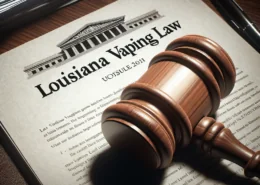Exploring the Latest Vape Tax Motions in the US
In recent years, the topic of vape taxes has become a subject of debate and discussion in the United States. While some states have proposed and implemented taxes on vaping products, others have opposed such measures. This article delves into the latest developments regarding vape tax motions in the US, focusing on the failed vape tax bill in Alaska and the passing of Senate Bill 975 in Hawaii. Additionally, we explore scientific insights into the effects of vape taxes and their impact on public health, consumer behavior, and the economy.
Alaska’s Failed Vape Tax Bill
Alaska’s Senate Bill 89, introduced by Sen. Stevens, aimed to impose a 25% wholesale tax on vaping products and raise the legal age to purchase vapes to 21. Unfortunately, this bill failed for the third time as Gov. Mike Dunleavy vetoed it. The opposition to the tax was clear in Dunleavy’s letter to the Senate, stating his reluctance to support a tax burden on the people of Alaska.
In 2022, Senate Bill 45 proposed a more substantial 35% wholesale vape tax. However, it faced a similar fate due to the opposition from Gov. Dunleavy. These unsuccessful attempts highlight the challenges in implementing vape taxes in Alaska.
Vape Tax in Canada and the Concerns
Across the border in Canada, vape taxes have also sparked discussions. The Canadian Vape Association (CVA) has expressed concerns about the tax structure, which imposes a fee of $5 for the first 10mL in any sealed container and an additional $1 per 10mL for extra liquid. The CVA argues that this tax diminishes the incentive for smokers who wish to quit by switching to a safer and more affordable alternative. The affordability of vaping is a significant factor that influences smokers’ decisions when contemplating a switch.
Read more:
Vape Tax in Canada
The Implications of Vape Tax in Hawaii
While Alaska’s vape tax bill failed, Hawaii has taken a different approach. The state recently passed Senate Bill 975, which subjects vaping products to the same taxation as other tobacco products. The bill now awaits Gov. Josh Green’s signature and, if approved, will come into effect on July 1st. This move aligns Hawaii’s vaping taxation policy with its approach to traditional tobacco products.
Read more:
Hawaii New Vaping Tax
The Impact of Vape Taxes
Positive Impact on Public Health
A study conducted in Argentina analyzed the effects of a potential tobacco tax increase by simulating its implementation. The findings indicated that such a tax could lead to a shift in employment from tobacco-related sectors to other areas of the economy while also positively impacting public health. Overall, the study concluded that the benefits of implementing a tobacco tax outweighed any potential repercussions.
Increase in Cigarette Sales
In contrast to the positive findings regarding tobacco taxes, a group of researchers led by renowned tobacco economist Michael Pesko found a different outcome when it comes to vape taxes. Their 2020 study examined the weekly sales data of various national retailers, including drug stores, food stores, dollar stores, club stores, and mass merchandisers. The research indicated that setting a tax on vaping products resulted in a significant increase in cigarette sales.
The burden of vape taxes predominantly falls on consumers as the increased tax translates into higher retail prices. Consequently, many vapers reverted back to purchasing cigarettes due to the affordability factor. Pesko’s study revealed that for every Juul-sized e-cigarette eliminated as a result of an e-cigarette tax, approximately 1.9 packs of cigarettes were purchased instead.
Vapes and Cigarettes as Economic Substitutes
A subsequent study co-authored by Pesko, titled “The effects of e-cigarette taxes on e-cigarette prices and tobacco product sales: Evidence from retail panel data,” further supported the notion that vapes and cigarettes are economic substitutes. By analyzing the NielsenIQ Retail Scanner Dataset (NRSD) from 2013 to 2019, the study provided compelling evidence of the impact of vape prices on cigarette sales. The findings reinforced the idea that an increase in the consumption of one product leads to a decrease in the consumption rate of the other.
Conclusion
The debate surrounding vape taxes in the US continues to evolve, with varying outcomes in different states. While Alaska’s recent vape tax bill failed for the third time, Hawaii successfully passed Senate Bill 975, aligning the taxation of vaping products with that of traditional tobacco products. Scientific studies offer insights into the impact of these taxes, highlighting the potential positive effects of tobacco taxes on public health while raising concerns about vape taxes leading to an increase in cigarette sales.
As policymakers and stakeholders consider the implications of vape taxes, it is essential to strike a balance between public health objectives, consumer behavior, and economic factors. Understanding the complex relationship between vaping and smoking, as well as the consequences of taxation, is crucial for informed decision-making.
FAQs
Are vape taxes effective in reducing vaping rates?
While the impact of vape taxes on vaping rates may vary, some studies suggest that increased taxes on vaping products can lead to a decrease in their consumption. However, it is essential to consider the potential unintended consequence of increased cigarette sales as vapers switch back to smoking.
Do vape taxes benefit public health?
Tobacco taxes have been shown to have positive effects on public health by reducing tobacco consumption. However, the impact of vape taxes on public health is more nuanced. It is crucial to carefully evaluate the potential unintended consequences and consider comprehensive strategies that address both vaping and smoking.
How do vape taxes affect consumer behavior?
Vape taxes tend to translate into higher retail prices for vaping products, which can influence consumer behavior. Some vapers may revert back to smoking cigarettes due to the increased costs. Understanding the economic substitutes nature of vapes and cigarettes is crucial in predicting consumer responses to vape taxes.
What are the economic implications of vape taxes?
Vape taxes can have economic repercussions, affecting both the vaping industry and related sectors. Job shifts from tobacco-related sectors to other areas of the economy may occur, as observed in some studies analyzing tobacco tax increases. Balancing economic considerations with public health objectives is a key aspect of formulating effective taxation policies.
Are there alternatives to vape taxes to promote public health?
There are various approaches to promote public health without solely relying on vape taxes. These include comprehensive regulation, education campaigns, and supporting evidence-based cessation methods. A holistic approach that addresses the complexities of vaping, smoking, and public health can yield more effective results.
- Austria Plans to Ban Disposable E-Cigarettes - August 5, 2025
- Vaping vs. THC Drinks: Which Cannabis Option Is Right for You? - August 4, 2025
- Colombia’s New Vape Law: A Reality Check on Enforcement - August 4, 2025









